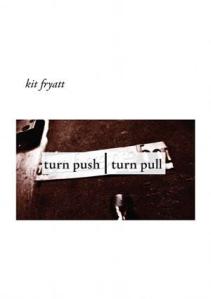‘turn push | turn pull’ by Kit Fryatt
-Reviewed by Suzannah Evans–
Corrupt Press is a Paris-based press run by Dylan Harris, who is particularly interested in publishing poetry in English by poets for whom English is a second language. Kit Fryatt’s pamphlet collection turn push | turn pull uses a mixture of tongues to truly take apart language as a form of expression. For example in the poem slobpaedar; ‘marbh | Tod | mort |wan’. From their own knowledge the reader has to piece their understanding together, which de-familiarises language and questions the experience of drawing meaning from the words themselves.
Dreams are used as inspiration throughout the collection. I particularly enjoyed BoHiCa which has the weird familiarity of a dream sequence and accurately captures the feeling of waking; ‘relief I have not confessed myself / to someone I don’t fancy in awake-life’. There is humour here too and a witty turn of phrase; ‘spft | grnk says the coffee machine. It is the cartridge sort’.
Plurality is central to this collection and several of Fryatt’s poems could be read in a variety of ways; the format of the text does not always suggest an obvious reading. I’m unsure of how successful some of these poems would be in performance because of this as the simultaneous arrangement of words and phrases seems vital to the poetry as it appears on the page.
The poem it does not exist by a play of words reads as two separate texts interwoven with each other:
‘It was an ATR 72, turboprop,
some recent research suggests maybe
twenty-some rows of seats two by two
conceptual thought is anterior to language’
The poem plays with the problem of discussing language in poetry, concluding that poems about language ‘need to be about something else too’ which, through the alternating lines of text, this poem achieves effectively, forcing the reader to search for coherence in a poem that holds together and pulls itself apart simultaneously. It can also be read as a mission statement for Fryatt’s collection, which embraces ambiguity and celebrates the plural possibilities of language.
Initially I found the ideas in this poem difficult to grasp of and it felt a little like solving a hard clue in a cryptic crossword. There are other aspects of the puzzle to be solved here; the contents page lists titles which are not printed with the poems themselves so the reader constantly turns back to the front of the book almost as if looking for the answers or clues. However there is far more than just novelty value to Fryatt’s work; what she achieves here is discursive and subtle rather than gimmicky.
There’s no denying that Fryatt’s poetry could be described as difficult and I did require access to a search engine at all times, confident as she is in throwing in references to mythology, history and using snippets of other languages. However, when poetry is engaging it becomes necessary to do the required research. This is a collection that encourages re-reading through its beauty and strangeness.



